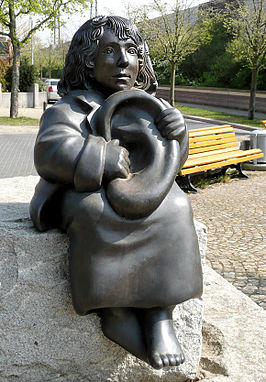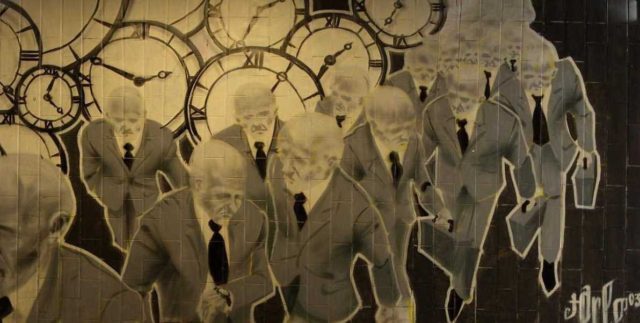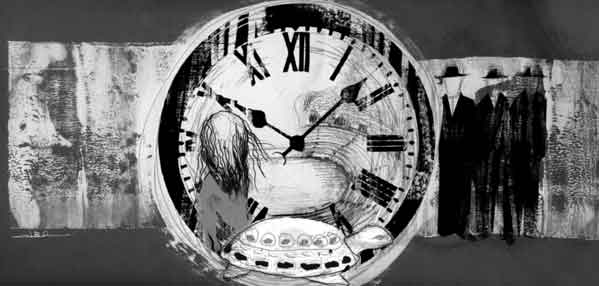“Time is life itself, and life resides in the human heart.”
-Michael Ende, Momo
Momo is a little-known book written by German author Michael Ende in 1973. The story is simple and sweet with tremendous teachings about the nature of time, the present moment, and the love which gives meaning to life.
In the story Momo is a young child of indeterminate age and origin, living by herself in an abandoned stone amphitheater outside of the city. An amphitheater is essentially a giant ear, a place to listen, and a place to gather as a community, and to enjoy the arts of imagination. That it is abandoned shows that the society has forgotten these values, and Momo dwelling in this place revives those values.
Momo distinguishes herself in her community by her ability to listen, deeply, and with full attention, to her friends. Birds learn how to sing again, enemies resolve their differences, people find their own voices again, because of her gift of listening.

“She listened in a way that made slow-witted people have flashes of inspiration. Momo could listen in such a way that worry and indecisive people knew their own minds from one moment to the next, or shy people felt suddenly confident and at ease, or down-hearted people felt happy and hopeful. And someone felt that his life had been an utter failure, and that he himself was only one among millions of wholly unimportant people who could be replaced as easily as broken windowpanes, he would go and pour his heart out to Momo. And, even as he spoke, he would come to realize by some mysterious means that he was absolutely wrong: that there was only one person like himself in the whole world, and that, consequently, he mattered to the world in his own particular way.
Many were the evenings when, after her friends had gone home, she would sit by herself in the middle of the old stone amphitheater, with the sky’s starry vault overhead, and simply listen to the great silence around her. Whenever she did this, she felt she was sitting at the center of a giant ear, listening to the world of the stars, and she seemed to hear a soft but majestic music that touched her heart in the strangest way. On nights like these, she always had the most beautiful dreams.”
-Michael Ende, Momo
Listening is a property of the full attention, which is a faculty of the essence. Momo, as the beautiful essence can listen with her whole heart, can see with the imagination, is beyond time and space. She lives in the present moment and understands a profound truth about the nature of time.

Meanwhile, in the city itself, an insidious presence arises in the form of the men in grey who run the Time Saving bank. Citizens are urged to start saving their time in the bank, and the promise is that they will then collect interest on their time and have plenty of it when they retire.
The people begin to rush more in their lives in order to “save time”. The little things in life are overlooked and ignored or decried as “time wasting” and therefore almost unethical in this new world.
The city changes, becomes colder and more grey, the people are harried, rushed, and irritable, all trying to save more and more time. The men in grey hear about Momo and her wealth of time and find her to be a threat. Men in grey agents start to look for her but she is sent a guide in the form of a tortoise with written messages on her shell.

Momo follows the tortoise, slowly, step by step, and because of their perfect timing, are able to elude the men in grey that are rushing after her.
She finds herself beyond the edge of the city, in an unusual place with light that seems to come from every direction. She is lead into the abode of Professor Hora (Father Time) and he shows her a sacred space: the heart of time.
A perfectly still lake like a mirror, and from the distance a pendulum silently swings across near the surface of the water, and as it does a perfect, exquisite lily rises to the surface. As it unfolds it emits the most beautiful fragrance and is the most precious and wondrous thing imaginable. It peaks into full life as the pendulum reaches the center of the lake, and as it slowly sweeps by, the flower begins to fade. Momo wants to weep as she sees this flower starting to lose its petals and shrivel and as the pendulum disappears into the distance again, it dies.
And then the pendulum starts to swing back and another lily, just as magnificent but somehow different and unique, begins to bloom. Professor Hora says these are “hour lilies”, the beauty and uniqueness of every moment that blooms and fades. And this exists within our own heart.
Momo learns that the men in grey are taking the people’s hour lilies that they have deposited in the time-saving bank, drying them, and rolling them into cigars to smoke. The men in grey are just parasites that live on the dead hours of other people, while stealing away their lives through distraction and false promise of a future they must hurry toward.
In the end, Momo defeats the men in grey and frees the stolen hour lilies, which return to their natural owners. The people come out of their reverie and wonder what the hurry to “save time” was about, and begin to appreciate their human connections once again.
This story is a beautiful illustration of how the ego steals our time, our lives, our precious hours and moments. We reclaim our hour lilies whenever we remember the present moment, when we fight against the inertia of life that makes us rush toward an unknown future, and stay rooted in our hearts.

